牛津译林版(2019)必修 第三册Unit 2 Natural disasters Extended reading 课件(共66张PPT)
文档属性
| 名称 | 牛津译林版(2019)必修 第三册Unit 2 Natural disasters Extended reading 课件(共66张PPT) |
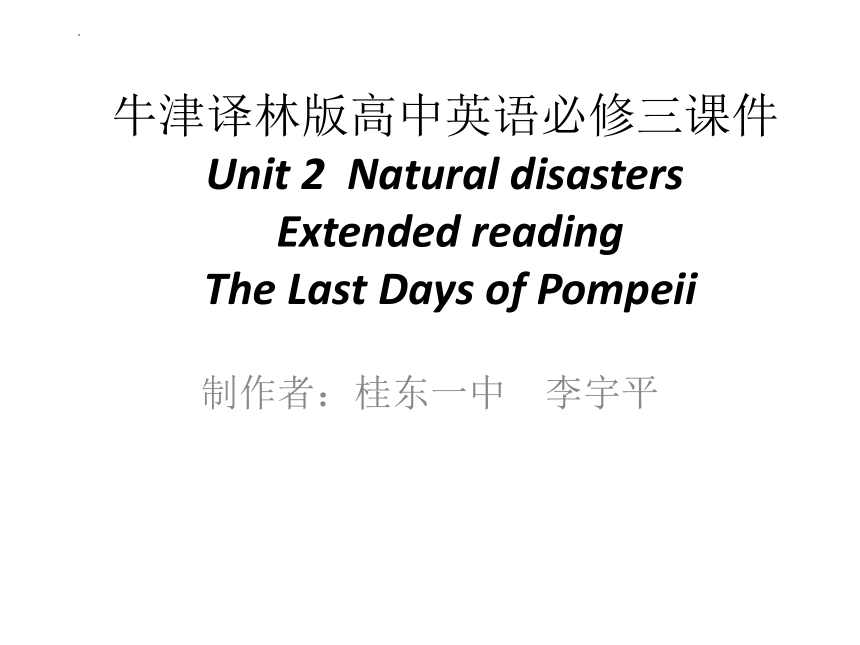
|
|
| 格式 | pptx | ||
| 文件大小 | 2.8MB | ||
| 资源类型 | 教案 | ||
| 版本资源 | 牛津译林版(2019) | ||
| 科目 | 英语 | ||
| 更新时间 | 2023-09-11 11:24:45 | ||
图片预览

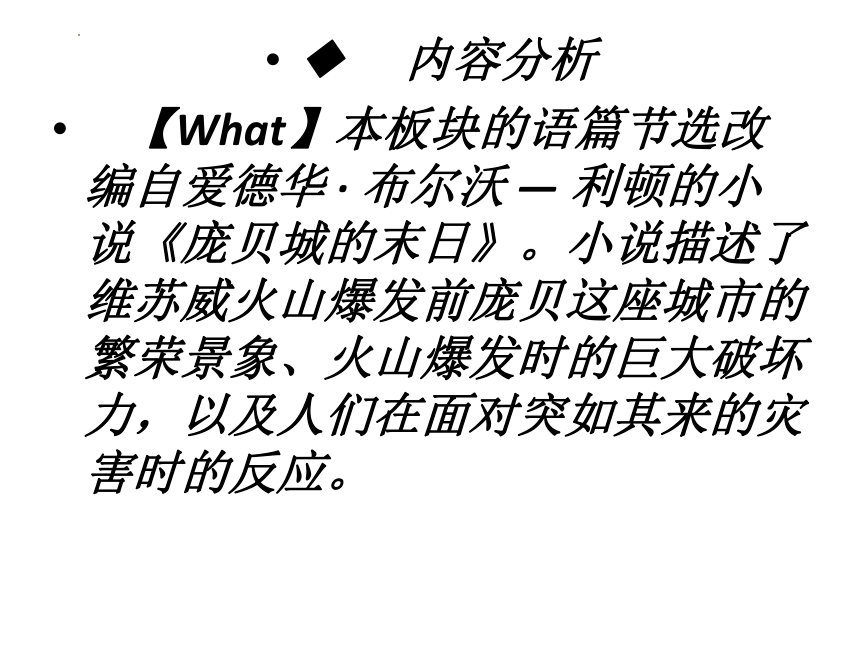
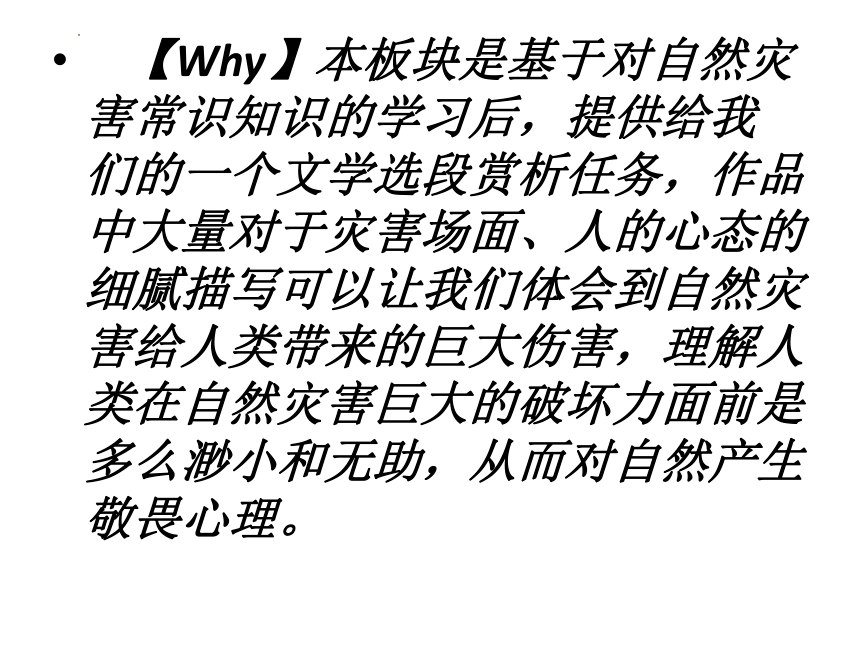

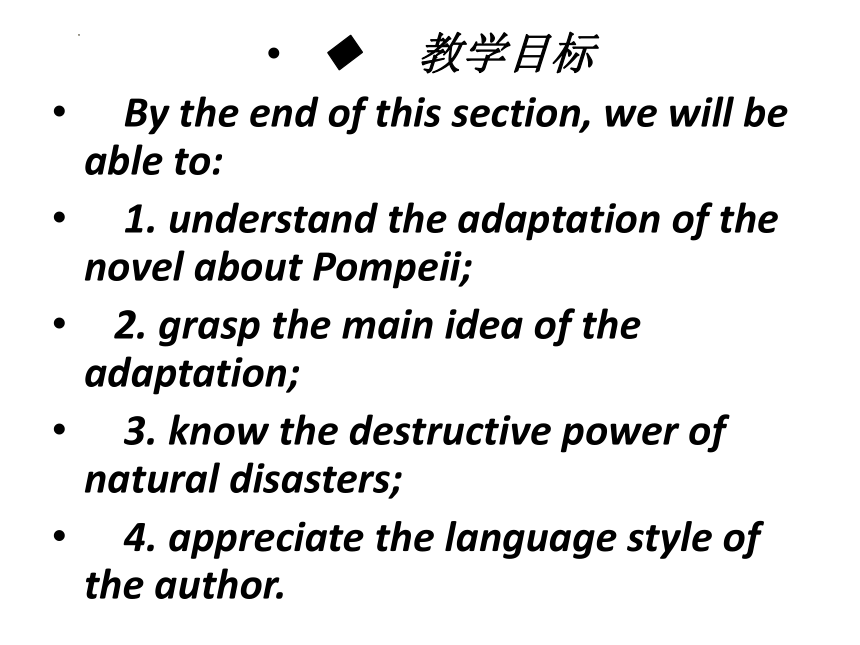
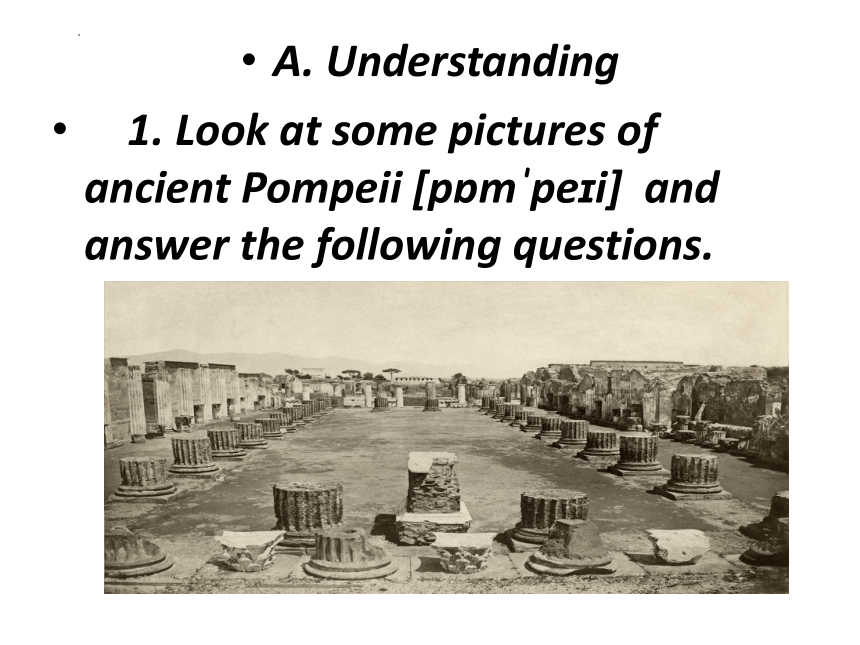
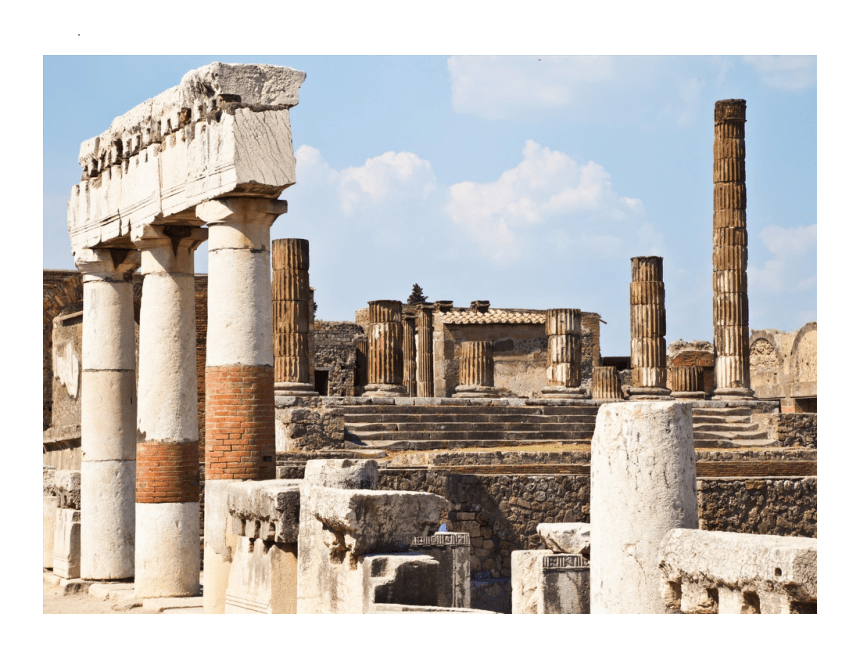
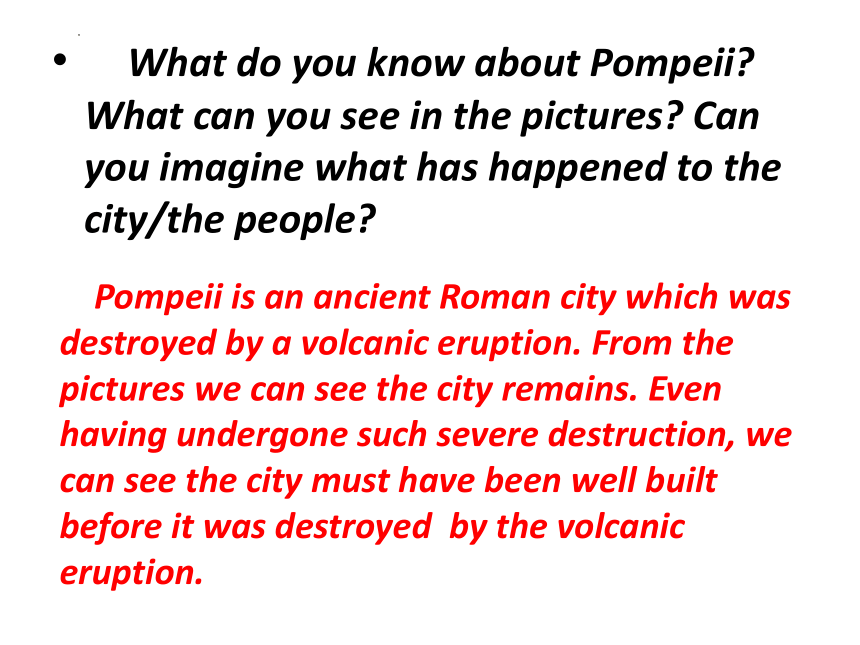
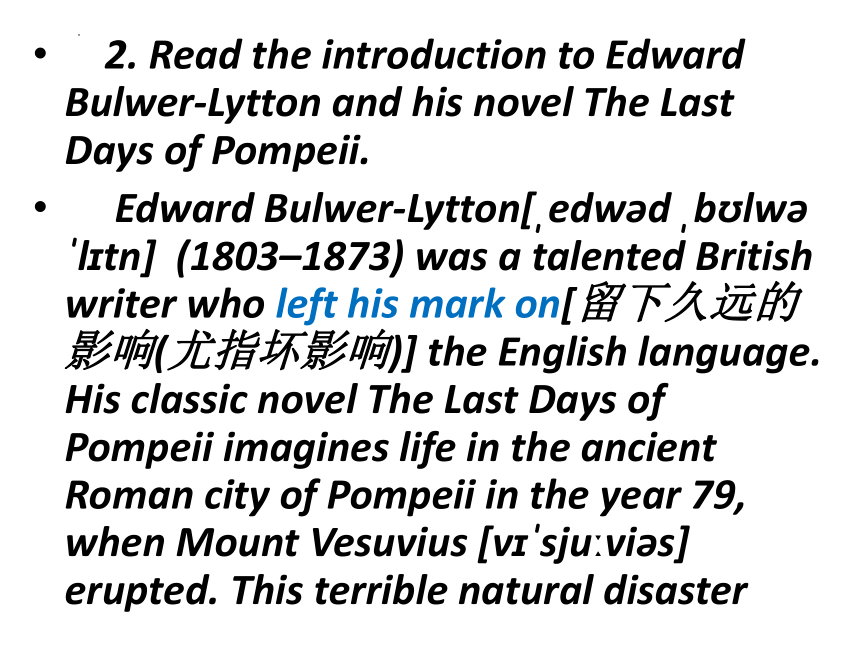
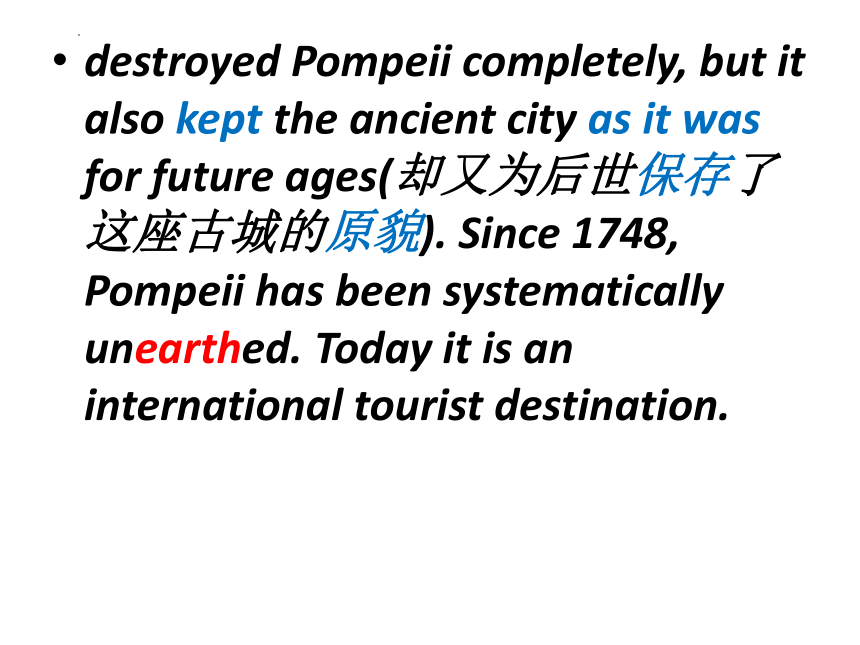
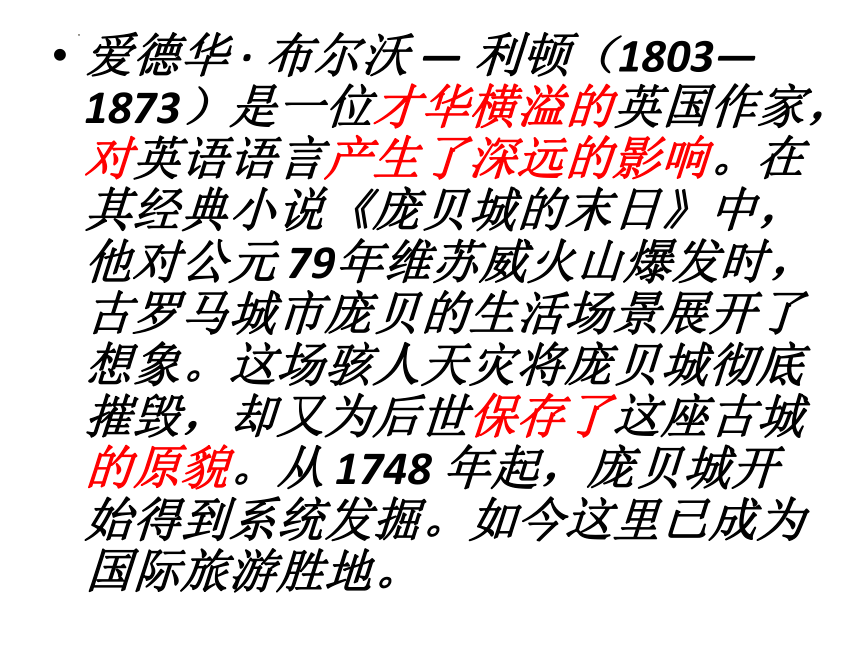

文档简介
(共66张PPT)
牛津译林版高中英语必修三课件
Unit 2 Natural disasters
Extended reading
The Last Days of Pompeii
制作者:桂东一中 李宇平
◆ 内容分析
【What】本板块的语篇节选改编自爱德华 · 布尔沃 — 利顿的小说《庞贝城的末日》。小说描述了维苏威火山爆发前庞贝这座城市的繁荣景象、火山爆发时的巨大破坏力,以及人们在面对突如其来的灾害时的反应。
【Why】本板块是基于对自然灾害常识知识的学习后,提供给我 们的一个文学选段赏析任务,作品中大量对于灾害场面、人的心态的细腻描写可以让我们体会到自然灾害给人类带来的巨大伤害,理解人类在自然灾害巨大的破坏力面前是多么渺小和无助,从而对自然产生敬畏心理。
【How】本文以火山爆发前、中、后的时间顺序为线索展开叙述,用形象生动的笔墨刻画了灾难前城市的繁荣和灾难中的惨烈,由此形成了强烈的对比。作者用丰富的想象描摹了灾难中人们的行为动作,用文字展现了灾难发生时他们的恐惧和混乱,最后以深沉的笔触抒发了今日人们面对庞贝城遗址时的感叹。
◆ 教学目标
By the end of this section, we will be able to:
1. understand the adaptation of the novel about Pompeii;
2. grasp the main idea of the adaptation;
3. know the destructive power of natural disasters;
4. appreciate the language style of the author.
A. Understanding
1. Look at some pictures of ancient Pompeii [p m pe i] and answer the following questions.
What do you know about Pompeii What can you see in the pictures Can you imagine what has happened to the city/the people
Pompeii is an ancient Roman city which was destroyed by a volcanic eruption. From the pictures we can see the city remains. Even having undergone such severe destruction, we can see the city must have been well built before it was destroyed by the volcanic eruption.
2. Read the introduction to Edward Bulwer-Lytton and his novel The Last Days of Pompeii.
Edward Bulwer-Lytton[ edw d b lw l tn] (1803–1873) was a talented British writer who left his mark on[留下久远的影响(尤指坏影响)] the English language. His classic novel The Last Days of Pompeii imagines life in the ancient Roman city of Pompeii in the year 79, when Mount Vesuvius [v sju vi s] erupted. This terrible natural disaster
destroyed Pompeii completely, but it also kept the ancient city as it was for future ages(却又为后世保存了这座古城的原貌). Since 1748, Pompeii has been systematically unearthed. Today it is an international tourist destination.
爱德华 · 布尔沃 — 利顿(1803—1873)是一位才华横溢的英国作家,对英语语言产生了深远的影响。在其经典小说《庞贝城的末日》中,他对公元 79年维苏威火山爆发时,古罗马城市庞贝的生活场景展开了想象。这场骇人天灾将庞贝城彻底摧毁,却又为后世保存了这座古城的原貌。从 1748 年起,庞贝城开始得到系统发掘。如今这里已成为国际旅游胜地。
3. Answer the following question.
What is the novel The Last Days of Pompeii about
The novel imagines life in the ancient Roman city of Pompeii in the year 79, when Mount Vesuvius erupted.
4. Read the whole excerpt and fill in the following mind map.
Before the
volcanic
eruption
2 to 4
During the
volcanic
eruption
5
After the
volcanic
eruption
Pompeii was a typical Roman city. In its little shops, its tiny palaces, its forum[ (古罗马城镇中讨论商业和政治问题的)广场], its wine bars, its theatre—in the energy(活力) and skill of its people, you saw a model of the whole Roman Empire. △Trading ships bringing imports to the city or carrying exports overseas, along with golden pleasure boats(游艇;游船) for the rich, were crowded together in the glassy (波光粼粼的) water of the port.
along with sb/sth
A. in addition to sb/sth; in the same way as sb/sth 除…以外(还);与…同样地
She lost her job when the factory closed, along with hundreds of others.工厂倒闭时,她和成百上千的其他人一样失去了工作。
B. 赞同某事;和某人观点一致
I don't go along with her views on private medicine.在私人行医的问题上,我不敢苟同她的观点。
The boats of the fishermen moved rapidly in all directions. Above all, the cloud-capped top of Mount Vesuvius appeared. △ Its ashy rocks, now dark, now light, told a story of past eruptions that might have warned the city what was to come!火山岩忽明忽暗,讲述着几度喷发的往事,这原本可以警告这座城市里的人们,即将到来的是什么!
now… now…时而…时而…
Her moods kept changing─now happy, now sad.她的情绪总是变幻不定——时而欢喜,时而忧伤。
might have done 表示过去本可以做而实际并没有做,含有轻微的责备或惋惜之意。
She might have lost the opportunity if her mother hadn’t insisted on her going. 要不是妈妈坚持让她去,她可能就失去这个机会了。
be to do sth
A. (表示后来发生的事)
He was to regret that decision for the rest of his life (= he did regret it) .
他终生都将后悔作出了那一决定。
B. (表示必须或应该)
I am to call them once I reach the airport.
我一到机场就得给他们打电话。
You are to report this to the police.
你应该报警。
What is to be done about this problem 该如何处理这个问题?
C.(表示安排或计划时用)
They are to be married in June.
他们计划于六月份结婚。
The awful night rolled[(时间)消逝,流逝]slowly away, and the dawn greyly broke on THE LAST DAY OF POMPEII! The crowd looked upwards, and saw, with unspeakable fear, a huge cloud shooting from the top of the volcano. It took the form of a huge tree: the trunk, blackness, the branches, fire!可怕的夜晚缓缓退去,晦暗的晨光开启了庞贝城的末日!人们抬头仰望,眼前景象让他们感到莫名恐惧,只见一团庞大的云正从火山口喷薄而出。它形似一株巨树:树干,黑魆魆的;枝叶,那是火!
(1)“ the trunk, blackness, the branches, fire ”是以省略形式呈现,简短的句式强调了火山的形态,营造了一种火山爆发时紧张、扣人心弦的氛围。
(2) take the form of :“呈现 ……的 形状”。
This valley takes the form of a big “U”.这座山谷呈一个大大的 U 形。
This fire moved and changed in colour with every moment: now it was wildly(极其;非常) bright, now of a pale(浅色的;淡色的) and dying red, and now again it burnt with an unbearable light!
火焰翻腾着,颜色变幻不定,时而极明亮,时而又变得微弱,呈现熄灭之前的暗红,时而又烧起来,放出刺眼的强光!
The cries of women broke out; the men looked at each other, but were silent. At that moment, they felt the earth shaking beneath their feet; beyond in the distance, they heard the crash [(突然间响起的)巨大声响 ] of falling roofs. A moment later, the mountain-cloud seemed to roll towards them, dark and rapid, like a river;
过了片刻,山上的云团似乎正向他们滚滚而来,阴沉迅猛,如汹涌的江水
at the same time, it threw out a shower(一大批;一阵;一连串) of ashes and huge pieces of burning stone! △ Over the empty streets—over the forum—far and wide —with many a noisy crash in the stormy sea—fell that awful shower!
与此同时,云团中抛洒下阵雨似的火山灰和大块大块燃烧着的石头,落在空荡荡的街道,落在广场上,四面八方,还有许多掉在波涛汹涌的大海里,发出阵阵巨响 ——下了一场可怕的大雨!
本句最重要的信息以主句形式出现在最后,次要的信息出现在句首,通常,这样的句式称为“圆周句”或者“掉尾句”。这种句式可以营造一种悬念,抓住读者的注意力,在末尾形成高潮,有力地表达重要的信息。除此之外,“圆周句”的句子结构往往显得严谨有力,通过重点信息收尾以突出整个句子的完整性。这种句式一般在正式书面文体中出现较多。
The more expensive kind of antique shop where rare objects are beautifully displayed in glass cases to keep them free from dust is usually a forbidding place.
高档一点的古玩店为了防尘,把文物漂亮地陈列在玻璃柜子里,那里往往令人望而却步。
分析:该句话所描述的对象是“the more expensive kind of antique shop”即“相对比较高档的古玩店”,作者想表述的重点信息是“(这些古玩店)令人望而却步”,而“令人望而却步”即“is usually a forbidding place”这个重点信息作者迟迟没让它出现,直到句末。
熟悉了"圆周句”之后,我们接下来介绍松散句”。其实"松散句“是和圆周句“相对应的。“松散句”即指英语中这样的句子:作者把主要信息和实质部分在句子的前面首先提出来,因而读者在看到最初的几个词后就知道这句话的意思,随后句子后面附加大量修饰语或补充细节的说明。有时候"松散句"因为太长,包含附加信息太多,也会干扰到读者对于句子的理解能力。
但一般情况下"松散句”仍是英语表达中较“圆周句”而言更常用的句式,因为英语语言本来就有着”高频率使用定语从句、伴随状语等补充信息“进行进一步阐述说明的习惯,许多以超长定语从句结尾或者以多重伴随状语结尾的句子都属于“松散句”。
松散句:Canada is certainly a less violent place than the United States, since in the U.S. a violent crime is committed every thirty-one seconds, compared with one every four minutes in Canada.
掉尾句:Since in the U.S. a violent crime is committed every thirty-one seconds, compared with one every four minutes in Canada, Canada is certainly a less violent place than the United States.
many a (formal) (与单数名词及动词连用)许多,大量
Many a good man has been destroyed by drink.
许多好人都毁在了饮酒上。
Many a mother tries to act out her unrealized dreams through her daughter.
有许多母亲都试图在女儿身上实现自己未竟的梦想。
Each turned to fly—each running, pressing, pushing against the other. If, in the darkness, wife was separated from husband, or parent from child, there was no hope of their meeting again. Each hurried blindly and fearfully on. So came the earthquake ... and so ended life in Pompeii.
所有人都赶忙飞奔 — 他们奔跑,拥挤,你推我搡。黑暗中,一旦妻离子散,就绝不可能重逢了。每个人都惊慌失措地盲目奔逃。这时,地震来了……庞贝城的生活就此终结。
Nearly seventeen centuries had rolled [(时间)流逝] away before the city of Pompeii was dug from its silent resting place. Its walls were fresh as if painted yesterday; not a single colour changed on the rich pattern of its floors.时间流过了近十七个世纪,庞贝城终于从它寂静的长眠之地被发掘出来。它的墙壁依然新得像昨天刚刚刷完;地板上繁复的图案,一点都没有褪色。
before conj.
A.(直到…)才;(过了…)才
It was some time before the door opened in response to his ring.
他按完门铃后过了一会儿门才打开。
It was some time before I realized the truth.
过了很长一段时间我才悟出真相。
B. “没等…就…”,“…就…”,等到…
Before I could sit down, she offered me a cup of tea.
没等我坐下,她就给我端上了一杯茶。
I had not gone a mile before I felt tired.
还没有走一英里路,我就觉得疲倦了。
C.(必须先具备某一条件)才能;在…之前(必须具备某一条件);
There was additional work to be done before all the troops would be ready.
在全军准备就绪之前,还有一些杂事必须处理。
D. 以免;不然
Put that away before it gets broken.
把它收好,免得砸碎了。
E. (formal) rather than (宁可…而)不愿
I will starve before I give in.
我宁愿饿死,也不投降!
resting place
A.休息处;休息场所
B.安息地;安眠处;长眠之地
as if/as though 好像;仿佛
Anne shrugged, as if she didn't know.
安妮耸了耸肩,好像她并不知晓。
He talks about Rome as if he had been there before.他说起罗马来好像他以前去过罗马似的。
He opened his mouth as if he would say something.
他张开嘴好像要说什么。
连词+doing
状语从句的省略
连词+done
连词+to do
连词+介词短语
连词+形容词
连词+名词
状语从句的省略
状语从句的省略
表示正在进行或主动的动作时,省略后的句式是“连词+doing”。
Be careful when you are crossing the river.
Be careful when crossing the river.
状语从句的省略
表示被动时,省略后的句式是
“连词+done”。
When she was asked what she would do in the future, she made no answer.
When asked what she would do in the future, she made no answer.
状语从句的省略
表示将要发生的动作时,省略后的句式是“连词+to do”。
The baby opened the book as if he was going to find something.
The baby opened the book as if to find something.
状语从句的省略
While I was at college, I tried to read as many books as possible.
状语从句省略后,保留的是“连词+介词短语”。
While at college, I tried to read as many books as possible.
状语从句的省略
如果状语从句中有it is时,it is可以同时省略,即“连词+形容词”。
I’d like to take you here this weekend if it is possible.
I’d like to take you here this weekend if possible.
状语从句的省略
He acts as if he were an expect.
状语从句省略后,保留的是“连词+名词”。
He acts as if an expect.
1. When these products were first introduced to the market, they
enjoyed great success.
→ When first ___________ to the market, these products
enjoyed great success.
2. When we look at the picture at a distance, we find it more
beautiful.
→ When _________ at a distance, we find the picture more
beautiful.
3. She hurriedly left the room as if she was angry.
→ She hurriedly left the room as if ________.
句型转换
introduced
angry
looking
1. —How are you getting on with your work
—Oh, I’m sorry. Things aren’t going so well as _________(按照
计划).
2. —How many poor students will there be in our school by 2015
—There will be only a few, if _______(如果有任何贫困生的话).
3. Doctors have said that as many as 50% of patients don’t take
medicine _______ _________ (按照说明).
4. I won’t go to the birthday party even if _______(即使被邀请).
完成句子
planned
any
as directed
invited
1. 如果有必要,给他打个电话。
翻译句子
Please give him a ring if necessary.
She made a lot of friends while studying abroad.
Once made, the plan should be carried out whatever happens.
3. 在国外读书时,她交了很多朋友。
2. 一旦制定好计划,无论发生什么,就要坚持实施。
4. 参与这个活动的学生比我们预料的要多。
The number of the students who took part in the activity was larger than expected.
In its forum, the half-finished columns seemed as if just left by the workman’s hand. Long after fire and ash came for (为某种目的而来取;向……冲来;对……进行袭击) the people of Pompeii, the remains of their beautiful city survive to remind us that human lives burn bright and short.
广场上,那些尚未完工的石柱看起来就像刚刚离开工匠之手。在大火和火山灰袭击庞贝人很久很久之后,他们美丽城市的遗迹得以留存下来,提醒我们人类的生命灿烂而短暂。
5. Read paragraph 1 again and answer the following questions.
(1) What was the city of Pompeii like before the volcano erupted
It was a typical Roman city. Trading ships bringing imports to the city or carrying exports overseas, along with golden pleasure boats for the rich, were crowded together in the glassy water of the port. The boats of the fishermen moved rapidly in all directions.
(2) What was the evidence of past eruptions of Mount Vesuvius
6. Read paragraphs 2-4 again and rearrange the sentences about the scene of the volcanic eruption in right order.
Its ashy rocks, now dark, now light.
a. The fire moved and changed in colour with every moment.
b. The mountain-cloud rolled near, dark and rapid, like a river. It threw out a shower of ashes and huge pieces of burning stone!
c. A huge cloud shot from the peak of the volcano, looking like a huge tree of fire.
d. The earth began to shake and the sound of falling roofs could be heard.
e. The earthquake came.
c
a
d
b
e
7. Read the last paragraph again and answer the following questions.
(1) What did the city remains look like after it was unearthed
Its walls were fresh as if painted yesterday; not a single colour changed on the rich pattern of its floors. In its forum, the half-finished columns seemed as if just left by
the workman’s hand.
(2) What do the remains of the city remind us of
8. Have students finish part A on page 26.
The remains of the beautiful city survive to remind us that human lives burn bright and short.
A. Write a summary of the excerpt from the novel. Use the following ideas to help you.
Before the volcanic eruption…
During the volcanic eruption…
After the volcanic eruption…
Possible answer
Pompeii was a typical Roman Empire port city. Trading ships, busy fishing boats and pleasure boats showed a prosperous city. But the last day of Pompeii ended with a volcanic eruption: the earth shook and buildings fell down while people ran away from an ash cloud that was rolling towards them. Then Pompeii was showered with (向…抛撒;撒落) ashes and burning stones.
Seventeen centuries later, Pompeii’s ruins were discovered with half-finished columns and paint on the walls that still looked fresh. The remains of Pompeii are a reminder that human life is short and vulnerable [ v ln r bl] [(身体上或感情上)脆弱的,易受…伤害的] in the face of natural disasters.
B. Appreciating
1. Read the first and last paragraph and answer the following question.
Compare the first and last paragraph. What effect do they create
The first paragraph reproduces(再现)the vibrancy ['va br ns ](活跃; 活力) of Pompeii by describing its beauty and prosperity. And the last paragraph describes the remains of the ancient city after it has been lying still(静止的;平静的;安静的;寂静的)and buried for nearly seventeen centuries.
It creates a strong comparison between Pompeii’s lively past and lifeless present. By doing so,the author wants to remind us that in the flowing river of time(在时间的长河中), human’s life is just a ripple (波纹;细浪;涟漪) and in the face of Mother Nature’s power, human beings are small and weak.
2. Finish part B on page 26.
How does the author create a sense of fear and confusion during the volcanic eruption
In paragraph 3, the author uses the phrases “the cries of women”, “the earth shaking” and “shower of ashes” to let the reader hear, feel and see what is happening in Pompeii at that moment.
Similes[ s m li](明喻) help the reader visualize (使形象化;想象;构思;设想) what is happening: “the mountain-cloud seemed to roll towards them, dark and rapid, like a river”. In paragraph 4,verb-ing forms like “running, pressing, pushing” create feelings of confusion because they show that these actions are happening at the same time.
Fear is created with phrases like “wife was separated from husband, or parent from child” showing that in the darkness, everyone in Pompeii risked being separated—no one was safe.
3. Finish part C on page 26.
People in Pompeii were not aware of the signs before the volcano erupted, and the city was destroyed. Do you think that we will be better able to protect ourselves from natural disasters in the future Why or why not
Possible answer
Option 1
Yes, I believe we will be better able to protect ourselves from natural disasters in the future. The development of science and technology will improve the ability to predict the arrival of natural disasters and help us be better organized and prepared for disasters.
Option 2
No. No matter how advanced science and technology may be in the future, natural disasters will always challenge us because most of them are unpredictable. Human technical skill will never match the power of nature so our ability to protect ourselves will always be limited and this means that we will always be victims of natural disasters in some way.
牛津译林版高中英语必修三课件
Unit 2 Natural disasters
Extended reading
The Last Days of Pompeii
制作者:桂东一中 李宇平
◆ 内容分析
【What】本板块的语篇节选改编自爱德华 · 布尔沃 — 利顿的小说《庞贝城的末日》。小说描述了维苏威火山爆发前庞贝这座城市的繁荣景象、火山爆发时的巨大破坏力,以及人们在面对突如其来的灾害时的反应。
【Why】本板块是基于对自然灾害常识知识的学习后,提供给我 们的一个文学选段赏析任务,作品中大量对于灾害场面、人的心态的细腻描写可以让我们体会到自然灾害给人类带来的巨大伤害,理解人类在自然灾害巨大的破坏力面前是多么渺小和无助,从而对自然产生敬畏心理。
【How】本文以火山爆发前、中、后的时间顺序为线索展开叙述,用形象生动的笔墨刻画了灾难前城市的繁荣和灾难中的惨烈,由此形成了强烈的对比。作者用丰富的想象描摹了灾难中人们的行为动作,用文字展现了灾难发生时他们的恐惧和混乱,最后以深沉的笔触抒发了今日人们面对庞贝城遗址时的感叹。
◆ 教学目标
By the end of this section, we will be able to:
1. understand the adaptation of the novel about Pompeii;
2. grasp the main idea of the adaptation;
3. know the destructive power of natural disasters;
4. appreciate the language style of the author.
A. Understanding
1. Look at some pictures of ancient Pompeii [p m pe i] and answer the following questions.
What do you know about Pompeii What can you see in the pictures Can you imagine what has happened to the city/the people
Pompeii is an ancient Roman city which was destroyed by a volcanic eruption. From the pictures we can see the city remains. Even having undergone such severe destruction, we can see the city must have been well built before it was destroyed by the volcanic eruption.
2. Read the introduction to Edward Bulwer-Lytton and his novel The Last Days of Pompeii.
Edward Bulwer-Lytton[ edw d b lw l tn] (1803–1873) was a talented British writer who left his mark on[留下久远的影响(尤指坏影响)] the English language. His classic novel The Last Days of Pompeii imagines life in the ancient Roman city of Pompeii in the year 79, when Mount Vesuvius [v sju vi s] erupted. This terrible natural disaster
destroyed Pompeii completely, but it also kept the ancient city as it was for future ages(却又为后世保存了这座古城的原貌). Since 1748, Pompeii has been systematically unearthed. Today it is an international tourist destination.
爱德华 · 布尔沃 — 利顿(1803—1873)是一位才华横溢的英国作家,对英语语言产生了深远的影响。在其经典小说《庞贝城的末日》中,他对公元 79年维苏威火山爆发时,古罗马城市庞贝的生活场景展开了想象。这场骇人天灾将庞贝城彻底摧毁,却又为后世保存了这座古城的原貌。从 1748 年起,庞贝城开始得到系统发掘。如今这里已成为国际旅游胜地。
3. Answer the following question.
What is the novel The Last Days of Pompeii about
The novel imagines life in the ancient Roman city of Pompeii in the year 79, when Mount Vesuvius erupted.
4. Read the whole excerpt and fill in the following mind map.
Before the
volcanic
eruption
2 to 4
During the
volcanic
eruption
5
After the
volcanic
eruption
Pompeii was a typical Roman city. In its little shops, its tiny palaces, its forum[ (古罗马城镇中讨论商业和政治问题的)广场], its wine bars, its theatre—in the energy(活力) and skill of its people, you saw a model of the whole Roman Empire. △Trading ships bringing imports to the city or carrying exports overseas, along with golden pleasure boats(游艇;游船) for the rich, were crowded together in the glassy (波光粼粼的) water of the port.
along with sb/sth
A. in addition to sb/sth; in the same way as sb/sth 除…以外(还);与…同样地
She lost her job when the factory closed, along with hundreds of others.工厂倒闭时,她和成百上千的其他人一样失去了工作。
B. 赞同某事;和某人观点一致
I don't go along with her views on private medicine.在私人行医的问题上,我不敢苟同她的观点。
The boats of the fishermen moved rapidly in all directions. Above all, the cloud-capped top of Mount Vesuvius appeared. △ Its ashy rocks, now dark, now light, told a story of past eruptions that might have warned the city what was to come!火山岩忽明忽暗,讲述着几度喷发的往事,这原本可以警告这座城市里的人们,即将到来的是什么!
now… now…时而…时而…
Her moods kept changing─now happy, now sad.她的情绪总是变幻不定——时而欢喜,时而忧伤。
might have done 表示过去本可以做而实际并没有做,含有轻微的责备或惋惜之意。
She might have lost the opportunity if her mother hadn’t insisted on her going. 要不是妈妈坚持让她去,她可能就失去这个机会了。
be to do sth
A. (表示后来发生的事)
He was to regret that decision for the rest of his life (= he did regret it) .
他终生都将后悔作出了那一决定。
B. (表示必须或应该)
I am to call them once I reach the airport.
我一到机场就得给他们打电话。
You are to report this to the police.
你应该报警。
What is to be done about this problem 该如何处理这个问题?
C.(表示安排或计划时用)
They are to be married in June.
他们计划于六月份结婚。
The awful night rolled[(时间)消逝,流逝]slowly away, and the dawn greyly broke on THE LAST DAY OF POMPEII! The crowd looked upwards, and saw, with unspeakable fear, a huge cloud shooting from the top of the volcano. It took the form of a huge tree: the trunk, blackness, the branches, fire!可怕的夜晚缓缓退去,晦暗的晨光开启了庞贝城的末日!人们抬头仰望,眼前景象让他们感到莫名恐惧,只见一团庞大的云正从火山口喷薄而出。它形似一株巨树:树干,黑魆魆的;枝叶,那是火!
(1)“ the trunk, blackness, the branches, fire ”是以省略形式呈现,简短的句式强调了火山的形态,营造了一种火山爆发时紧张、扣人心弦的氛围。
(2) take the form of :“呈现 ……的 形状”。
This valley takes the form of a big “U”.这座山谷呈一个大大的 U 形。
This fire moved and changed in colour with every moment: now it was wildly(极其;非常) bright, now of a pale(浅色的;淡色的) and dying red, and now again it burnt with an unbearable light!
火焰翻腾着,颜色变幻不定,时而极明亮,时而又变得微弱,呈现熄灭之前的暗红,时而又烧起来,放出刺眼的强光!
The cries of women broke out; the men looked at each other, but were silent. At that moment, they felt the earth shaking beneath their feet; beyond in the distance, they heard the crash [(突然间响起的)巨大声响 ] of falling roofs. A moment later, the mountain-cloud seemed to roll towards them, dark and rapid, like a river;
过了片刻,山上的云团似乎正向他们滚滚而来,阴沉迅猛,如汹涌的江水
at the same time, it threw out a shower(一大批;一阵;一连串) of ashes and huge pieces of burning stone! △ Over the empty streets—over the forum—far and wide —with many a noisy crash in the stormy sea—fell that awful shower!
与此同时,云团中抛洒下阵雨似的火山灰和大块大块燃烧着的石头,落在空荡荡的街道,落在广场上,四面八方,还有许多掉在波涛汹涌的大海里,发出阵阵巨响 ——下了一场可怕的大雨!
本句最重要的信息以主句形式出现在最后,次要的信息出现在句首,通常,这样的句式称为“圆周句”或者“掉尾句”。这种句式可以营造一种悬念,抓住读者的注意力,在末尾形成高潮,有力地表达重要的信息。除此之外,“圆周句”的句子结构往往显得严谨有力,通过重点信息收尾以突出整个句子的完整性。这种句式一般在正式书面文体中出现较多。
The more expensive kind of antique shop where rare objects are beautifully displayed in glass cases to keep them free from dust is usually a forbidding place.
高档一点的古玩店为了防尘,把文物漂亮地陈列在玻璃柜子里,那里往往令人望而却步。
分析:该句话所描述的对象是“the more expensive kind of antique shop”即“相对比较高档的古玩店”,作者想表述的重点信息是“(这些古玩店)令人望而却步”,而“令人望而却步”即“is usually a forbidding place”这个重点信息作者迟迟没让它出现,直到句末。
熟悉了"圆周句”之后,我们接下来介绍松散句”。其实"松散句“是和圆周句“相对应的。“松散句”即指英语中这样的句子:作者把主要信息和实质部分在句子的前面首先提出来,因而读者在看到最初的几个词后就知道这句话的意思,随后句子后面附加大量修饰语或补充细节的说明。有时候"松散句"因为太长,包含附加信息太多,也会干扰到读者对于句子的理解能力。
但一般情况下"松散句”仍是英语表达中较“圆周句”而言更常用的句式,因为英语语言本来就有着”高频率使用定语从句、伴随状语等补充信息“进行进一步阐述说明的习惯,许多以超长定语从句结尾或者以多重伴随状语结尾的句子都属于“松散句”。
松散句:Canada is certainly a less violent place than the United States, since in the U.S. a violent crime is committed every thirty-one seconds, compared with one every four minutes in Canada.
掉尾句:Since in the U.S. a violent crime is committed every thirty-one seconds, compared with one every four minutes in Canada, Canada is certainly a less violent place than the United States.
many a (formal) (与单数名词及动词连用)许多,大量
Many a good man has been destroyed by drink.
许多好人都毁在了饮酒上。
Many a mother tries to act out her unrealized dreams through her daughter.
有许多母亲都试图在女儿身上实现自己未竟的梦想。
Each turned to fly—each running, pressing, pushing against the other. If, in the darkness, wife was separated from husband, or parent from child, there was no hope of their meeting again. Each hurried blindly and fearfully on. So came the earthquake ... and so ended life in Pompeii.
所有人都赶忙飞奔 — 他们奔跑,拥挤,你推我搡。黑暗中,一旦妻离子散,就绝不可能重逢了。每个人都惊慌失措地盲目奔逃。这时,地震来了……庞贝城的生活就此终结。
Nearly seventeen centuries had rolled [(时间)流逝] away before the city of Pompeii was dug from its silent resting place. Its walls were fresh as if painted yesterday; not a single colour changed on the rich pattern of its floors.时间流过了近十七个世纪,庞贝城终于从它寂静的长眠之地被发掘出来。它的墙壁依然新得像昨天刚刚刷完;地板上繁复的图案,一点都没有褪色。
before conj.
A.(直到…)才;(过了…)才
It was some time before the door opened in response to his ring.
他按完门铃后过了一会儿门才打开。
It was some time before I realized the truth.
过了很长一段时间我才悟出真相。
B. “没等…就…”,“…就…”,等到…
Before I could sit down, she offered me a cup of tea.
没等我坐下,她就给我端上了一杯茶。
I had not gone a mile before I felt tired.
还没有走一英里路,我就觉得疲倦了。
C.(必须先具备某一条件)才能;在…之前(必须具备某一条件);
There was additional work to be done before all the troops would be ready.
在全军准备就绪之前,还有一些杂事必须处理。
D. 以免;不然
Put that away before it gets broken.
把它收好,免得砸碎了。
E. (formal) rather than (宁可…而)不愿
I will starve before I give in.
我宁愿饿死,也不投降!
resting place
A.休息处;休息场所
B.安息地;安眠处;长眠之地
as if/as though 好像;仿佛
Anne shrugged, as if she didn't know.
安妮耸了耸肩,好像她并不知晓。
He talks about Rome as if he had been there before.他说起罗马来好像他以前去过罗马似的。
He opened his mouth as if he would say something.
他张开嘴好像要说什么。
连词+doing
状语从句的省略
连词+done
连词+to do
连词+介词短语
连词+形容词
连词+名词
状语从句的省略
状语从句的省略
表示正在进行或主动的动作时,省略后的句式是“连词+doing”。
Be careful when you are crossing the river.
Be careful when crossing the river.
状语从句的省略
表示被动时,省略后的句式是
“连词+done”。
When she was asked what she would do in the future, she made no answer.
When asked what she would do in the future, she made no answer.
状语从句的省略
表示将要发生的动作时,省略后的句式是“连词+to do”。
The baby opened the book as if he was going to find something.
The baby opened the book as if to find something.
状语从句的省略
While I was at college, I tried to read as many books as possible.
状语从句省略后,保留的是“连词+介词短语”。
While at college, I tried to read as many books as possible.
状语从句的省略
如果状语从句中有it is时,it is可以同时省略,即“连词+形容词”。
I’d like to take you here this weekend if it is possible.
I’d like to take you here this weekend if possible.
状语从句的省略
He acts as if he were an expect.
状语从句省略后,保留的是“连词+名词”。
He acts as if an expect.
1. When these products were first introduced to the market, they
enjoyed great success.
→ When first ___________ to the market, these products
enjoyed great success.
2. When we look at the picture at a distance, we find it more
beautiful.
→ When _________ at a distance, we find the picture more
beautiful.
3. She hurriedly left the room as if she was angry.
→ She hurriedly left the room as if ________.
句型转换
introduced
angry
looking
1. —How are you getting on with your work
—Oh, I’m sorry. Things aren’t going so well as _________(按照
计划).
2. —How many poor students will there be in our school by 2015
—There will be only a few, if _______(如果有任何贫困生的话).
3. Doctors have said that as many as 50% of patients don’t take
medicine _______ _________ (按照说明).
4. I won’t go to the birthday party even if _______(即使被邀请).
完成句子
planned
any
as directed
invited
1. 如果有必要,给他打个电话。
翻译句子
Please give him a ring if necessary.
She made a lot of friends while studying abroad.
Once made, the plan should be carried out whatever happens.
3. 在国外读书时,她交了很多朋友。
2. 一旦制定好计划,无论发生什么,就要坚持实施。
4. 参与这个活动的学生比我们预料的要多。
The number of the students who took part in the activity was larger than expected.
In its forum, the half-finished columns seemed as if just left by the workman’s hand. Long after fire and ash came for (为某种目的而来取;向……冲来;对……进行袭击) the people of Pompeii, the remains of their beautiful city survive to remind us that human lives burn bright and short.
广场上,那些尚未完工的石柱看起来就像刚刚离开工匠之手。在大火和火山灰袭击庞贝人很久很久之后,他们美丽城市的遗迹得以留存下来,提醒我们人类的生命灿烂而短暂。
5. Read paragraph 1 again and answer the following questions.
(1) What was the city of Pompeii like before the volcano erupted
It was a typical Roman city. Trading ships bringing imports to the city or carrying exports overseas, along with golden pleasure boats for the rich, were crowded together in the glassy water of the port. The boats of the fishermen moved rapidly in all directions.
(2) What was the evidence of past eruptions of Mount Vesuvius
6. Read paragraphs 2-4 again and rearrange the sentences about the scene of the volcanic eruption in right order.
Its ashy rocks, now dark, now light.
a. The fire moved and changed in colour with every moment.
b. The mountain-cloud rolled near, dark and rapid, like a river. It threw out a shower of ashes and huge pieces of burning stone!
c. A huge cloud shot from the peak of the volcano, looking like a huge tree of fire.
d. The earth began to shake and the sound of falling roofs could be heard.
e. The earthquake came.
c
a
d
b
e
7. Read the last paragraph again and answer the following questions.
(1) What did the city remains look like after it was unearthed
Its walls were fresh as if painted yesterday; not a single colour changed on the rich pattern of its floors. In its forum, the half-finished columns seemed as if just left by
the workman’s hand.
(2) What do the remains of the city remind us of
8. Have students finish part A on page 26.
The remains of the beautiful city survive to remind us that human lives burn bright and short.
A. Write a summary of the excerpt from the novel. Use the following ideas to help you.
Before the volcanic eruption…
During the volcanic eruption…
After the volcanic eruption…
Possible answer
Pompeii was a typical Roman Empire port city. Trading ships, busy fishing boats and pleasure boats showed a prosperous city. But the last day of Pompeii ended with a volcanic eruption: the earth shook and buildings fell down while people ran away from an ash cloud that was rolling towards them. Then Pompeii was showered with (向…抛撒;撒落) ashes and burning stones.
Seventeen centuries later, Pompeii’s ruins were discovered with half-finished columns and paint on the walls that still looked fresh. The remains of Pompeii are a reminder that human life is short and vulnerable [ v ln r bl] [(身体上或感情上)脆弱的,易受…伤害的] in the face of natural disasters.
B. Appreciating
1. Read the first and last paragraph and answer the following question.
Compare the first and last paragraph. What effect do they create
The first paragraph reproduces(再现)the vibrancy ['va br ns ](活跃; 活力) of Pompeii by describing its beauty and prosperity. And the last paragraph describes the remains of the ancient city after it has been lying still(静止的;平静的;安静的;寂静的)and buried for nearly seventeen centuries.
It creates a strong comparison between Pompeii’s lively past and lifeless present. By doing so,the author wants to remind us that in the flowing river of time(在时间的长河中), human’s life is just a ripple (波纹;细浪;涟漪) and in the face of Mother Nature’s power, human beings are small and weak.
2. Finish part B on page 26.
How does the author create a sense of fear and confusion during the volcanic eruption
In paragraph 3, the author uses the phrases “the cries of women”, “the earth shaking” and “shower of ashes” to let the reader hear, feel and see what is happening in Pompeii at that moment.
Similes[ s m li](明喻) help the reader visualize (使形象化;想象;构思;设想) what is happening: “the mountain-cloud seemed to roll towards them, dark and rapid, like a river”. In paragraph 4,verb-ing forms like “running, pressing, pushing” create feelings of confusion because they show that these actions are happening at the same time.
Fear is created with phrases like “wife was separated from husband, or parent from child” showing that in the darkness, everyone in Pompeii risked being separated—no one was safe.
3. Finish part C on page 26.
People in Pompeii were not aware of the signs before the volcano erupted, and the city was destroyed. Do you think that we will be better able to protect ourselves from natural disasters in the future Why or why not
Possible answer
Option 1
Yes, I believe we will be better able to protect ourselves from natural disasters in the future. The development of science and technology will improve the ability to predict the arrival of natural disasters and help us be better organized and prepared for disasters.
Option 2
No. No matter how advanced science and technology may be in the future, natural disasters will always challenge us because most of them are unpredictable. Human technical skill will never match the power of nature so our ability to protect ourselves will always be limited and this means that we will always be victims of natural disasters in some way.
同课章节目录
- Unit 1 Nature in the balance
- Welcome to the unit
- Reading
- Grammar and usage
- Integrated skills
- Extended reading
- Project
- Unit 2 Natural disasters
- Welcome to the unit
- Reading
- Grammar and usage
- Integrated skills
- Extended reading
- Project
- Unit 3 The world online
- Welcome to the unit
- Reading
- Grammar and usage
- Integrated skills
- Extended reading
- Project
- Unit 4 Scientists who changed the world
- Welcome to the unit
- Reading
- Grammar and usage
- Integrated skills
- Extended reading
- Project
